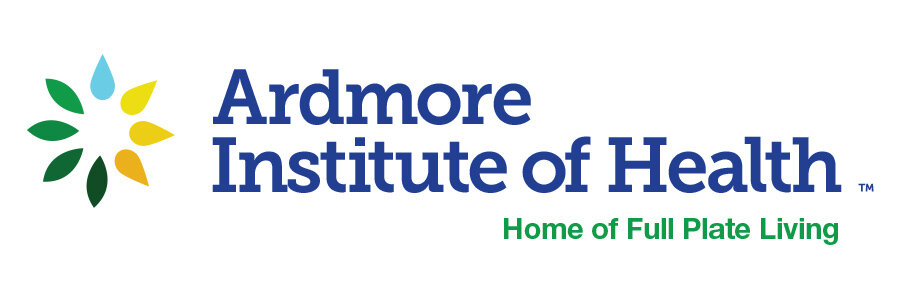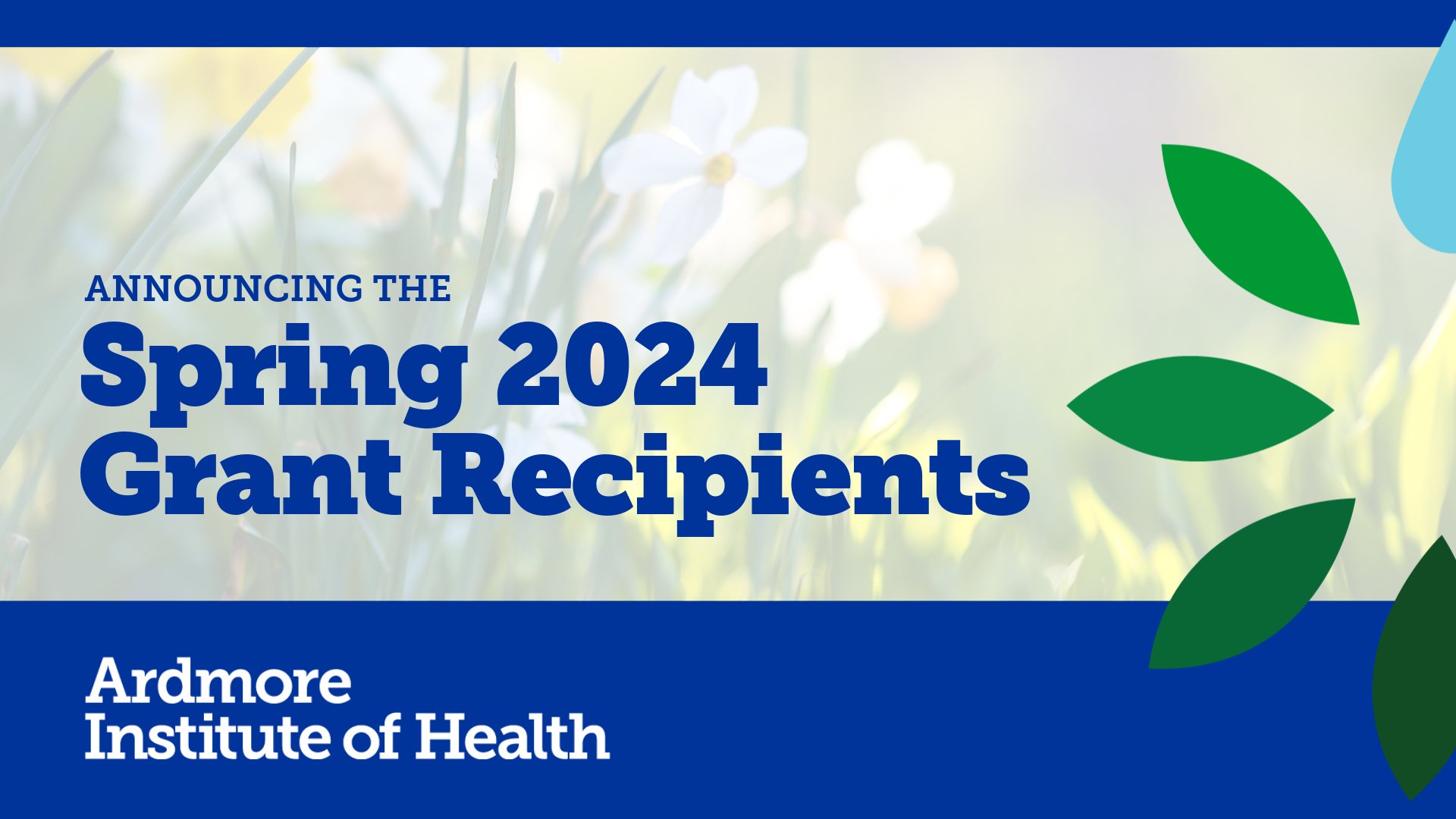Ardmore Institute of Health Announces Spring 2024 Grant Recipients
Ardmore Institute of Health (AIH) is delighted to announce its Spring 2024 grant recipients. Through grant-making, AIH partners with mission-aligned organizations by funding innovative projects that support AIH's strategic objectives.
This spring, AIH awarded $748,988 to eight projects that will help advance our vision: a future where healthy lifestyles provide an equitable and preferred method to prevent, treat, and reverse chronic diseases such as obesity, diabetes, and heart disease.
Continue reading to learn more about the eight projects.
Teaming Up with Public Health: Lifestyle Medicine
American Academy of Family Physicians Foundation | Leawood, KS
$250,000
The American Academy of Family Physicians (AAFP) is committed to enhancing health outcomes for families and communities through the integration of lifestyle medicine into mainstream primary care. Emphasizing collaboration and partnership development, this project will break down silos by identifying ways to align strategies, programs, and processes across primary care providers, public health, and community-based organizations using whole person health approaches through a health equity framework.
The proposed resources will help establish the nomenclature and a shared language for understanding across family medicine, public health, and community-based organizations. The goals for this project are to 1) Leverage existing materials and develop resources to increase awareness and understanding of the whole person health approach among AAFP members; 2) Provide support and technical assistance to a cohort of family medicine practices; and 3) Document lessons learned and disseminate findings across public health, lifestyle medicine, and family medicine audiences.
Anticipated outcomes of this project are 1) Increased availability and access to technical assistance, products, and other resources; 2) Increased awareness and understanding of whole person health concepts among AAFP members; and 3) Increased awareness of findings and tools. This project will strengthen the system infrastructure needed to equitably implement whole person health approaches into family medicine.
MGH Revere Food Pantry: Healthy Families Clinic and Teaching Kitchen Program: Year Three
Massachusetts General Hospital | Boston, MA
$126,000
With the Ardmore Institute of Health's support, MGH Revere Food Pantry: Healthy Families Clinic and Teaching Kitchen Program is modeling a Lifestyle Medicine program that showcases the power of a "Food Is Medicine" approach to sustainably and meaningfully improve community health. With the establishment of a program focused on healthy foods, patient education and empowerment, psychosocial support, and rigorous evaluation, the MGH Revere Food Pantry will stand apart from other organizations. It will be a pioneering example of a healthy lifestyle clinical and research program for the entire family addressing social determinants of health. Funding will support the third year of the three-year demonstration project targeting families receiving care from MGH Revere; have a teaching kitchen component; and will emphasize chronic disease management for hypertension, diabetes, and obesity. Specific year 3 goals include 1) Evaluate improvements in food insecurity, child health, and parental health over a 6-month period and 2) Conduct a Needs Assessment for how to best bring families into the teaching kitchen.
“F!reF!ghterF!t”: A Randomized Controlled Trial of Lifestyle Coaching Interventions for Obese Firefighters
Cambridge Health Alliance | Cambridge, MA
$100,000
Rationale/goals: Obesity is a major health hazard in the US fire service. It contributes to excess cancer, cardiovascular disease, and behavioral health issues. Obesity is negatively associated with 12 of 13 health priorities identified by the National Fallen Firefighter Foundation. Mitigating obesity is crucial to the fire service’s goals of reducing chronic diseases and their adverse economic/operational impacts.
Methods: At least 75 male firefighters self-reporting a body mass index (BMI) of >/= 30 kg/m2 AND interest in weight loss will complete a baseline health assessment including lifestyle scores, body composition, metabolic/hormonal indices, physical fitness, and behavioral health screens until 50 eligible firefighters have been consented and enrolled. After the initial clinical evaluation, 50 eligible firefighters will be randomized into the two study groups (about 25 firefighters to each arm): 1. General Health Instructions (CONTROL) and 2. Individual & Group Lifestyle Coaching based on the six pillars of Lifestyle Medicine & Full Plate Living. Participants will repeat all health/fitness measures at 3-, 6- and 9-months post-study entry. The two treatment groups will be compared on an intention-to-treat basis.
Anticipated outcomes: Compared to CONTROL, firefighters receiving the Lifestyle Coaching Intervention should achieve significantly greater improvements in body composition, metabolic & other health measures, as well as adopt healthy lifestyle behaviors.
Effectiveness and Implementation of the PAVING the Path to Wellness Lifestyle Medicine program: A Type 3 hybrid study
PAVING the Path to Wellness | Denver, CO
$75,988
Lifestyle medicine has the potential to address the chronic disease epidemic, but a lack of dissemination and implementation (D&I) research has prevented its widespread adoption into clinical and community settings. This project will examine the effectiveness and implementation of the PAVING the Path to Wellness lifestyle medicine program to both improve program delivery and lay foundational knowledge to advance clinical and public health practice in the lifestyle medicine space. Through this hybrid effectiveness-implementation design, we will:
1) Assess the impact of the PAVING program on the lifestyle medicine health behaviors using a validated pre/post-survey with at least 15 cohorts of 6-20 PAVING participants. We anticipate that the PAVING program will improve health behaviors.
2) Identify the barriers and facilitators to the successful implementation and growth of the program through semi-structured qualitative interviews with PAVING leaders and participants. Implementation constructs, including program acceptability, adaptability, process, and sustainability, will be assessed. We anticipate that the interviews will elicit critical insights to support program implementation.
The project will rigorously evaluate the PAVING the Path to Wellness program and promote the scaling of lifestyle medicine by providing a blueprint for other programs to better translate from research to practice.
Phase 3 Advancing Lifestyle Medicine among all Health Professionals
American College of Lifestyle Medicine | Chesterfield, MO
$75,000
Goal: To increase access to lifestyle medicine (LM) and close gaps in health equity by growing the LM workforce.
Methodology: Through outreach and educational programming, LM education, tools, and resources will be more widely distributed to the healthcare workforce, thus increasing the amount of healthcare workers throughout the United States who can utilize LM within their practice. Through academic and industry engagement and publications, policymakers, academia, health systems, and funders will gain access to information about the LM workforce composition, current LM work environments, and what the future LM workforce might look like.
Anticipated outcomes:
1) Through ACLM’s Partial and Full Academic Pathways, increased student access to health professions programs throughout the US offering educational content aligning with the 2022 Core Competencies in Lifestyle Medicine.
2) Delivery of tailored LM resource packages including high-quality training and complementary patient-facing material for workforce segments essential to public health including community health workers (CHWs), nurses, and community health specialists.
3) Increased numbers of qualified healthcare professionals taking the ACLM certification exam.
4) Research publications strategically placed to inform healthcare policymakers, health funders, and health professions faculty about the LM workforce and educational needs of this multidisciplinary group of healthcare workers.
The Teaching Kitchen Collaborative (TKC) Multisite Curriculum Study, UTHealth Houston SPH Site – Year 2
The University of Texas Health Science Center at Houston | Houston, TX
$75,000
The Teaching Kitchen (TK) Multisite Trial is an innovative program that combines evidence-based nutrition education with culinary learning for behavior change. This study aims to assess the feasibility and preliminary impact of the TK program on health outcomes and well-being across different sites and sociodemographic populations. The specific aims are:
1) To evaluate the feasibility and acceptability of a multidisciplinary TK lifestyle intervention among diverse urban, suburban, and rural-dwelling adults.
2) To identify the barriers and facilitators to effectively implementing the TK culinary and lifestyle intervention in clinical- and community-based settings using a mixed-methods (qualitative and quantitative) evaluation.
3) To assess the preliminary effectiveness of the TK culinary and lifestyle education intervention by comparing changes between the intervention and wait-list control groups from pre- to post-intervention.
This study is a randomized controlled trial of adults (n = 320) who are overweight or have class I-II obesity (BMI 25-39.9) and at least one metabolic disease marker (including fasting glucose, hemoglobin A1c, liver function, or fasting lipid profile).
Participants (n = 50 at the UTHealth site, 25 per group) in Cohort 2 will be measured at baseline, after the 16-week intensive culinary and lifestyle intervention (4 months), at the end of the intervention program (12 months), and after a 6-month follow-up period (18 months).
Anxiety and Depression Recovery Program
Shiloh Seventh-day Adventist Church | Chicago, IL
$30,000
This project will study the hypothesis that the incorporation of mental health education in combination with lifestyle education has positive benefits in improving mental health in marginalized communities. Goals include:
1) To improve mental health education and resources among individuals in historically marginalized communities.
2) To improve self-efficacy in the management of anxiety and depression in individuals in historically marginalized communities.
3) To increase healthy lifestyle habits in the management of anxiety and depression in individuals in historically marginalized communities.
This project will utilize an evidence-based 8-week anxiety and depression educational and lifestyle program. Anticipated outcomes include improved awareness of mental health issues in marginalized communities, reduced stigma, and improvements in self-reported mental health.
Community of Hope Healthy Lifestyle Program
Community of Hope | Washington, DC
$17,000
Community of Hope will offer the Healthy Lifestyle Program, an eight-week group health education initiative for patients with chronic diseases, three times in the grant period at our Marie Reed Health Center. This program will use the Full Plate Living Healthy Lifestyle Program curriculum, and patients will increase their knowledge of how good nutrition, physical activity, and mindfulness can improve health outcomes. Additionally, patients will utilize the Specific, Measurable, Achievable, Relevant, and Time-Bound (SMART) model to set goals that incorporate healthy nutrition practices, physical activity, and mindfulness strategies into their weekly routine. By the end of eight weeks, patients will achieve at least one of their goals. By the end of the program, patients will also have increased self-efficacy and improved health outcomes related to chronic disease management and emotional wellness, such as blood pressure control and sleep quality.
"We are delighted to partner with these organizations who are advancing lifestyle medicine in pursuit of whole health. Their work exemplifies the innovation and dedication needed to create a future where healthy living is possible and the preferred path to whole health."
- Ron Stout, President and CEO at AIH
Learn more about AIH grant-making, funding priorities, and the process for applying for funding below.

